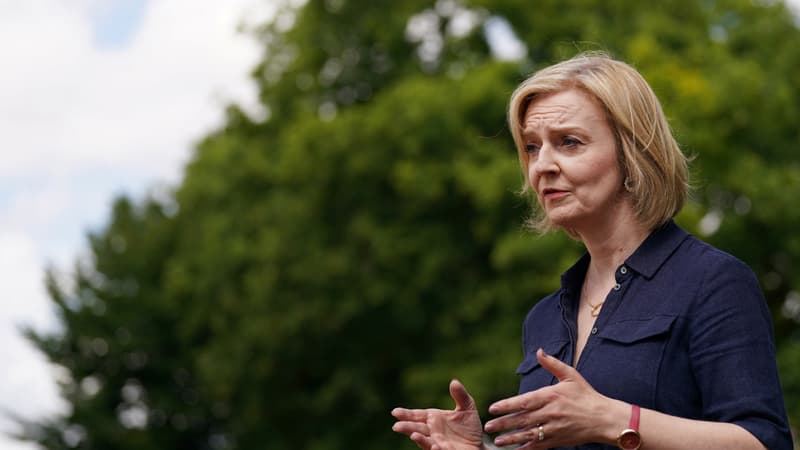Huge favourite, Liz Truss did not defy the odds and was chosen on Monday to take the leadership of the Conservative Party and succeed Boris Johnson as UK Prime Minister.
Foreign Secretary Elizabeth (known as Liz) Truss, 47, becomes the third woman to head a UK government. She won widely, with 57% of the votes, against Rishi Sunak (43%).
“Dear friends, dear colleagues, thank you for putting your trust in me to lead our great party,” he told the Conservatives, just after his victory was announced.
His election was hailed shortly after by Boris Johnson. The future former prime minister called on the members of his party to join “100%” to the one he was chosen to succeed.
Coming from a left wing
Born on July 26, 1975, married and the mother of two daughters, Liz Truss presents herself, with the enthusiasm of converts, as the embodiment of quintessential British conservatism.
However, her presence, even among conservatives, is far from self-evident: Liz Truss grew up in a very left-wing environment. By her own admission, she astonished her parents – a college maths professor father and a nuclear disarmament activist mother, whom she accompanied as a child to demonstrations with fake cardboard missiles – by finally going outright to the right.
Recently, she was accused of copying Margaret Thatcher by putting a hat on her head in Moscow’s Red Square, while during her childhood, Liz Truss demonstrated with her parents to demand the departure of the “Iron Lady”, a tutelary figure of the Conservatives.
“I didn’t know any Conservatives at my school. All my teachers were pro-Labour,” he told The Guardian.
At the prestigious University of Oxford, where he studied philosophy, economics and politics, he came to chair the Europhile Liberal Democrats group.
A first term as deputy in 2010
Before entering politics, Liz Truss spent ten years in the private sector, most notably as a business manager, “in the energy and telecommunications industry,” her profile on the government website specifies.
She was then a local councilor in south east London and then became an MP in 2010, for the constituency of South West Norfolk (east of England). In 2012, she entered government and has since held various portfolios, first Secretary of State for Education, then Minister of the Environment from 2014 to 2016. She also became the first female Minister of Justice, then Chief Secretary of the Treasury. .
Since the beginning of the campaign, some have liked to resurrect a nickname he had when he was in the Ministry of Education: the “human grenade”. “An ambiguous compliment”, he recently estimated in the tabloid Sun“means I do things.”
“My personal philosophy,” he also confesses to The Guardian newspaper, “is to give people the opportunity to make their own decisions.”
An anti-Brexit in 2016
As soon as Boris Johnson came to power in 2019, Liz Truss was appointed Minister for Women and Equality on September 10, 2019, but also Secretary of State for International Trade. In this role, she became the face of trade negotiations in post-Brexit London and familiarized herself with diplomatic circuits. A change of course for which she had defended remaining in the EU during the 2016 referendum, before changing her mind and saying that she saw economic opportunities in Brexit.
It also strives to forge new free trade alliances and concludes agreements with Japan, Australia and even Norway. For some of their detractors, these agreements only reintroduce benefits lost with the UK’s exit from the EU.
In foreign affairs during the war in Ukraine
Liz Truss has been head of the Foreign Office since September 2021. Both a consecration and an appointment, the second for a woman in this position, is seen as a way for Boris Johnson to try to maintain control over the ambitions of a Tory figure in ascent.
In this position, Liz Truss distinguished herself by her first conciliatory and then uncompromising attitude towards the European Union in the delicate negotiations on the post-Brexit provisions relating to the British province of Northern Ireland. She also has to her credit obtaining the release of the Iranian-British Nazanin Zaghari-Ratcliffe, detained for more than six years in Iran accused of conspiracy that she has always denied.
Alongside Boris Johnson, Liz Truss also embodied the UK’s massive support for Ukraine, not least thanks to economic sanctions on an unprecedented scale. On the trip to Moscow, however, she made a huge diplomatic blunder by saying that she would “never” recognize Moscow’s sovereignty over Rostov and Voronezh. However, these two cities near Ukraine are Russian and their membership in Russia is not in dispute.
Source: BFM TV


